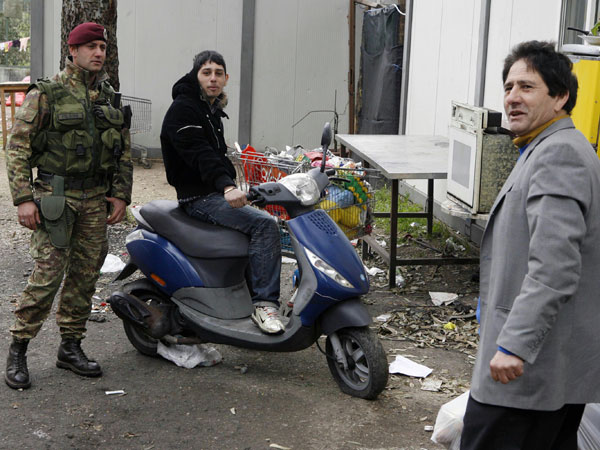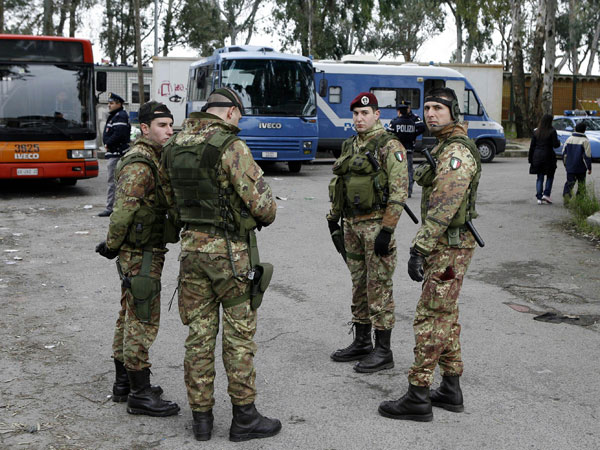REPORT on Roma communities in Rome, Naples and Milan
Roma Virtual Network
UNIRSI - International and National Union of Roma and Sinti In Italy
Federation of the Associations and the Autonomous Groups of Roma and Sinti in Italy
European and Roma Travellers Forum from Strasbourg
REPORT
Roma communities in Rome, Naples and Milan.
In response to recent political developments and the most recent wave of racism against Roma people in Italy, a coalition of organizations, including UNIRSI, undertook a first – hand human rights documentation in Italy (between 23 and 30 may, 2008). That organizations conducted a surveying doing interviews to approximately 100 Romani persons who were living in formal and informal camps in Rome, Naples, Florence, Brescia, Milan and Turin.

The organizations visited many formal and semi formal camps including: Secondigliano and Centro Lima (Naples); Salviati, River, Casilino 900 and Martora (Rome); Via Tribugnano (Milan); Nomads Camp of Brescia for Italian Sinti. The coalition also visited the following informal camps: Scampia, Ponticelli, Santa Maria, and Torre Annunziata Nord (Naples); Cave di Pietralata and an unnamed camp closed to Cave di Pietralata (Rome); Corsico and Bacula (Milan); Via Germagnano (Turin).
Despite being the country of Europe with the lowest percentage of Roma / Sinti (Greece counts equal number to Italy but with a population of only 10 million of people) Italy is behind at least 25 years compared to all policies integration for the people of the Roma / Sinti.
While there are no official Census, a census carried out from various organizations (incluiding UNIRSI) on a national scale shows that the Roma and Sinti in Italy are about 170,000, of which 70,000 with Italian citizenship and 100,000 (in constant increase from Bulgaria and especially Romania) from the Balkans.
30% of those 100,000 comes from Yugoslavia, and the rest comes from Romania, with a few hundred presences coming from Bulgaria and Poland.
The last two generations of Roma "Yugoslavs" were born in a country, Italy, which does not recognize the “jus soli” and then denies to children the basic requirements for a balanced education and integration: citizenship.
The minority of Roma / Sinti is characterized by low life expectancy (the average age is about 40 to 50 years) and by the presence of a high percentage of children (60% of the Roma and Sinti population is less than 18 years old. The 47% of children is from 6 to 14 years old; 23% of children is between 15 and 18 years old; the remaining percentage of children (30%) is between 0 and 5 years old).
The Roma and Sinti people with italian citizenship are about 70,000. Today in Italy the Sinti and Roma communities (called "gipsies" and "nomads" in dispregiative and ethnocentric way) are still object of discrimination, exclusion and segregation.
Discrimination is extended to all fields, in both the public and private, so the exclusion and economic and social segregation of Sinti and Roma becomes ethnic discrimination (Recommendation n.1557/2002 Council of Europe). In Italy, the many Roma and Sinti communities are not recognized as National Linguistic Minorities and therefore do not enjoy the rights that this status provides.

The social policies aimed at Roma and Sinti populations tend openly to social inclusion, and integration. Sinti and Roma communities are rarely considered protagonists of social thinking, of policies of integration, direct participation and cultural mediation. Italy denies to Sinti and Roma communities the application of the European directives on Linguistic Minorities protecting minority languages and also denies the Convention on National Minorities.
In many cases Roma and Sinti see denied the basic rights like residence, health, education, work. In Italy we still build the "nomads camps" which are places of segregation that imprison individuals against their will. In Italy, most of Councils, in contrast with the constitutional provisions (Article 16), deny the right to reside and move freely within the national territory to so-called "nomads" or "gipsies".
In this tragic situation Roma from Slovenia, Bosnia, Yugoslavia, Romania, Poland, Hungary are suffering all that extremely discriminatory policies. Entire families flee from their native lands due to ethnic conflicts and civil wars and Italy denies them the most basic rights.
For more information, please, read the text in attached *pdf file.
UNIRSI – Piazza Antonio Meucci, 18 – 00146 Rome - Italy.
UNIRSI president and ERTF Delegate Mr. Kasim Cizmic : e-mail: uni...@supereva.it
UNIRSI Secretary: Mr Balo Cizmic : e-mail: uni...@supereva.it
Web site: www.unirsi.net
UNIRSI – Piazza Antonio Meucci, 18 – 00146 Rome - Italy.
